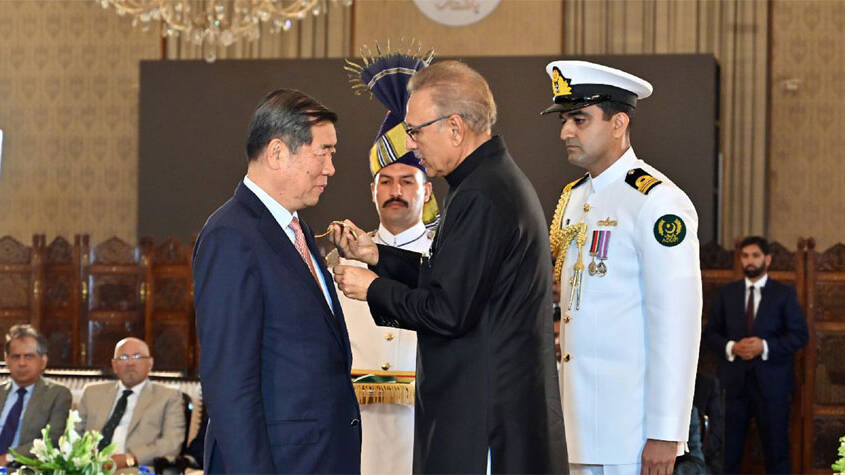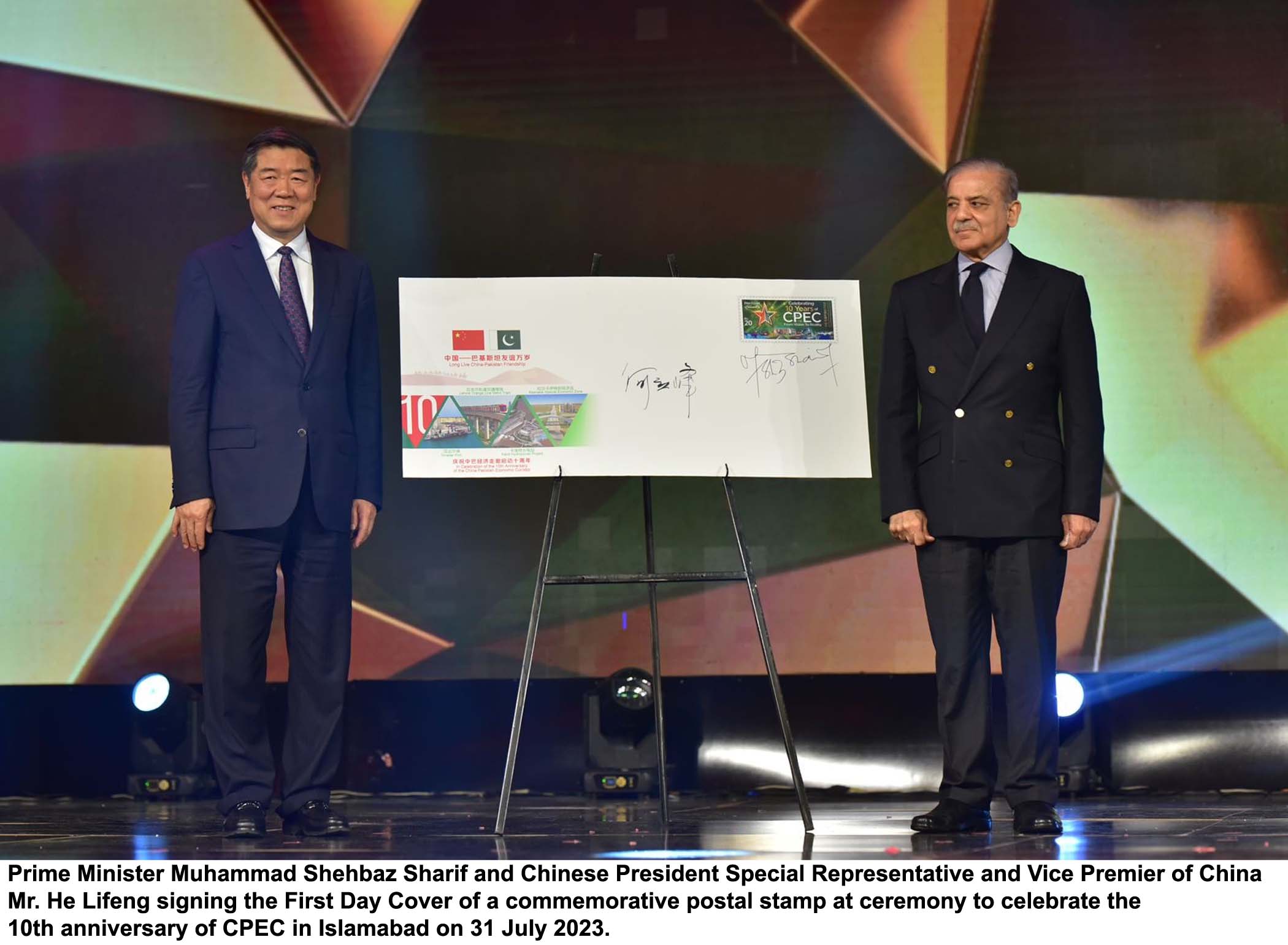President Arif Alvi conferred Pakistan’s second-highest civil award, Hilal-i-Pakistan (Crescent of Pakistan), on Chinese Vice Premier He Lifeng during an investiture ceremony held at Aiwan-e-Sadar in Islamabad on Monday.
The award was given to the Chinese dignitary to honour his role in the promotion of bilateral ties between Pakistan and China.
The ceremony was attended by Prime Minister Shehbaz Sharif and other civil and military leaders.
The Chinese vice premier arrived in Islamabad a day earlier. He was welcomed at the airport by Finance Minister Ishaq Dar and Interior Minister Rana Sanaullah.
According to the Foreign Office (FO), the visiting dignitary will be in Pakistan from July 30 to August 1 (Tuesday). He Lifeng will attend a ceremony celebrating a decade of CPEC as the chief guest.
Pakistan, China sign six agreements
Earlier today, China and Pakistan attended signed six agreements for the promotion of bilateral cooperation. The event was attended by PM Shehbaz, the Chinese vice premier, Foreign Minister Bilawal Bhutto-Zardari, Planning Minister Ahsan Iqbal and other foreign dignitaries.
Addressing the occasion, PM Shehbaz said, “I thank the Chinese president for sending his senior official to Pakistan, expressing the solidarity of people-to-people friendship between the two countries. This gesture demonstrates the strength of our friendship.”
“I have no doubt that we are entering into the second phase of CPEC. Today, we have signed some important documents which will enhance our economic cooperation, and we will undertake the second phase under a new mode,” he told the gathering.
The PM highlighted that the agreements would lead to investments in agriculture and IT, enabling Pakistan, with China’s support, to export items according to the requirements and standards of the Chinese government.
He emphasised, “The CPEC was signed by then prime minister Nawaz Sharif and Chinese President Xi Jinping, and it was implemented promptly.”
“Today, we can claim that under the CPEC, more than $25bn investment took place in power, energy, public transport, and other sectors.”
He also expressed gratitude to the Chinese vice premier for visiting Pakistan as the two countries celebrate ten years of the CPEC.
After the ceremony, delegation-level talks were held by PM Shehbaz and He Lifeng which encompassed multiple areas of bilateral cooperation.
PM welcomes Chinese vice premier
On Monday morning, the Chinese vice premier was accorded a welcome after he arrived at the Prime Minister’s House in Islamabad to meet PM Shehbaz Sharif.
The premier received the foreign dignitary at the main entrance of the PM House.
Upon He Lifeng’s arrival, the prime minister introduced his delegation comprising federal cabinet members Bilawal Bhutto-Zardari, Ishaq Dar, Rana Sanaullah, Syed Naveed Qamar, Ahsan Iqbal, Saad Rafiq, Marriyum Aurangzeb, Hina Rabbani Khar and Tariq Fatemi to the Chinese vice premier.
Taking to Twitter, the PM “warmly welcomed” the Chinese vice premier and the members of his delegation.
“They are visiting Pakistan to join us in celebrating the 10th anniversary of CPEC and witnessing first-hand the transformations brought about by this game-changing initiative,” PM Shehbaz said.
Earlier, the FO had also acknowledged Lifeng’s “prominent role” in China’s international economic relations and implementation of the Belt and Road Initiative, of which CPEC is a flagship project.
As the chairman of China’s National Development and Reform Commission from 2017 to 2023, he was “instrumental in the planning and execution of multiple CPEC projects in Pakistan”, the FO had said.
It had added that his visit was a part of regular high-level exchanges and dialogue between Pakistan and China and reflected the importance attached by both countries to further deepen their “all-weather strategic cooperative partnership, enhance economic and financial cooperation, advance high-quality development of CPEC and explore new avenues for strengthening trade and investment ties”.
Security tightened in Islamabad
According to the security details, around 2,716 personnel of police, Dolphin Force, Frontier Constabulary and Pakistan Army will be deployed to ensure foolproof security along the route and venues where the Chinese vice premier will stay and attend the ceremony.
Along with the Islamabad police, the Rawalpindi police will also perform security duties along the 39.5km route from Islamabad International Airport to the Punjab House.
As per the details, 10 superintendents, 18 security superintendents and 104 Dolphin Force personnel will be part of the security duties. The bomb disposal squad of the police’s special branch will sweep all bridges, culverts, underpasses, nullahs, metro bus stops, and other places along the route before the movement of dignitaries.
No vehicle will be parked along the route during the movements and security officials will report any suspected person or vehicles to senior officers.
The security personnel posted along the route will carry reflecting jackets, raincoats, bulletproof helmets and jackets, whistles and torches. Extra security will be ensured at sensitive points identified in the security plan. They will not be allowed to use mobile phones and have to display their official cards at all times.
Policemen will also be deployed on rooftops of high-rise buildings. They will be equipped with binoculars, wireless sets, and G-3 rifles.
A dedicated command and control room has been established by the Islamabad Safe City Authority to supervise security arrangements during the movement and stay of the delegation.
What is CPEC?
CPEC is a collection of infrastructure and other projects under construction throughout Pakistan since 2013. The vast initiative is intended to rapidly upgrade Pakistan’s required infrastructure and strengthen its economy by the construction of modern transportation networks, numerous energy projects and special economic zones.
The key agreement for the projects to be listed under CPEC was signed in 2013, and term sheets for them were signed during President Xi Jinping’s visit to Pakistan in 2015.
In November of 2016, CPEC became partly operational when Chinese cargo was transported overland to Gwadar port for onward maritime shipment to Africa and West Asia.
Islamabad has so far received $25.4 billion in direct Chinese investment in various transport, energy, and infrastructure schemes under the flagship connectivity and investment corridor project, under the flagship connectivity and investment corridor project, part of Beijing’s Belt and Road Initiative.

















